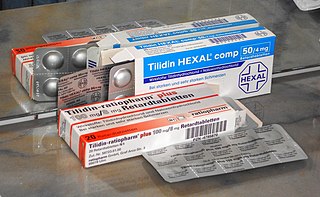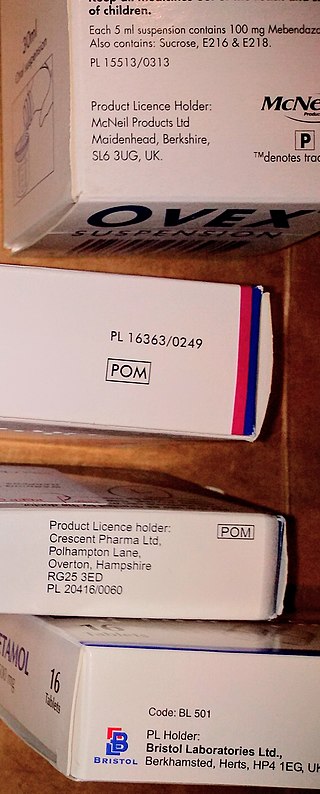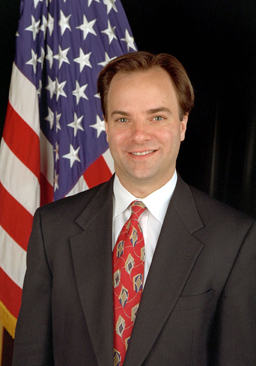
The United States Food and Drug Administration is a federal agency of the Department of Health and Human Services. The FDA is responsible for protecting and promoting public health through the control and supervision of food safety, tobacco products, caffeine products, dietary supplements, prescription and over-the-counter pharmaceutical drugs (medications), vaccines, biopharmaceuticals, blood transfusions, medical devices, electromagnetic radiation emitting devices (ERED), cosmetics, animal foods & feed and veterinary products.

A medication is a drug used to diagnose, cure, treat, or prevent disease. Drug therapy (pharmacotherapy) is an important part of the medical field and relies on the science of pharmacology for continual advancement and on pharmacy for appropriate management.
Prescription drug list prices in the United States continually are among the highest in the world. The high cost of prescription drugs became a major topic of discussion in the 21st century, leading up to the American health care reform debate of 2009, and received renewed attention in 2015. One major reason for high prescription drug prices in the United States relative to other countries is the inability of government-granted monopolies in the American health care sector to use their bargaining power to negotiate lower prices, and the American payer ends up subsidizing the world's R&D spending on drugs.

A prescription drug is a pharmaceutical drug that is permitted to be dispensed only to those with a medical prescription. In contrast, over-the-counter drugs can be obtained without a prescription. The reason for this difference in substance control is the potential scope of misuse, from drug abuse to practicing medicine without a license and without sufficient education. Different jurisdictions have different definitions of what constitutes a prescription drug.

Mark Barr McClellan is the director of the Robert J Margolis Center for Health Policy and the Margolis Professor of Business, Medicine and Health Policy at Duke University. Formerly, he was a senior fellow and director of the Health Care Innovation and Value Initiative at the Engelberg Center for Health Care Reform at The Brookings Institution, in Washington, D.C. McClellan served as commissioner of the United States Food and Drug Administration under President George W. Bush from 2002 through 2004, and subsequently as administrator of the Centers for Medicare and Medicaid Services from 2004 through 2006.

The pharmaceutical industry is an industry involved in medicine that discovers, develops, produces, and markets pharmaceutical goods for use as drugs that function by being administered to patients using such medications with the goal of curing or preventing disease. Pharmaceutical companies may deal in "generic" medications and medical devices without the involvement of intellectual property, in "brand" materials is specifically tied to a given company's history, or in both within different contexts. The industry's has various subdivisions are all subject to a variety of laws and regulations that govern entire financial processes including the patenting, efficacy testing, safety evaluation, and marketing of these drugs. The global pharmaceuticals market produced treatments worth $1,228.45 billion in 2020, in total, and this showed a compound annual growth rate (CAGR) of 1.8% given the results of recent events.
The Pharmaceutical Benefits Scheme (PBS) is a program of the Australian Government that subsidises prescription medication for Australian citizens and permanent residents, as well as international visitors covered by a reciprocal health care agreement. The PBS is separate to the Medicare Benefits Schedule, a list of health care services that can be claimed under Medicare, Australia's universal health care insurance scheme.
Pharmaceutical marketing is a branch of marketing science and practice focused on the communication, differential positioning and commercialization of pharmaceutical products, like specialist drugs, biotech drugs and over-the-counter drugs. By extension, this definition is sometimes also used for marketing practices applied to nutraceuticals and medical devices.
Epoetin alfa, sold under the brand name Epogen among others, is a human erythropoietin produced in cell culture using recombinant DNA technology. Epoetin alfa is an erythropoiesis-stimulating agent. It stimulates erythropoiesis and is used to treat anemia, commonly associated with chronic kidney failure and cancer chemotherapy. Epoetin alfa is developed by Amgen.

Marcia Angell is an American physician, author, and the first woman to serve as editor-in-chief of the New England Journal of Medicine. She is currently a Senior Lecturer in the Department of Global Health and Social Medicine at Harvard Medical School in Boston, Massachusetts.
McNeil Consumer Healthcare is an American medicals products company belonging to Kenvue consumer health group. It primarily sells fast-moving consumer goods such as over-the-counter drugs.
Direct-to-consumer advertising (DTCA) refers to the marketing and advertising of pharmaceutical products directly to consumers as patients, as opposed to specifically targeting health professionals. The term is synonymous primarily with the advertising of prescription medicines via mass media platforms—most commonly on television and in magazines, but also via online platforms.
Numerous governmental and non-governmental organizations have criticized the U. S. Food and Drug Administration for alleged excessive and/or insufficient regulation. The U.S. Food and Drug Administration (FDA) is an agency of the United States Department of Health and Human Services and is responsible for the safety regulation of most types of foods, dietary supplements, drugs, vaccines, biological medical products, blood products, medical devices, radiation-emitting devices, veterinary products, and cosmetics. The FDA also enforces section 361 of the Public Health Service Act and the associated regulations, including sanitation requirements on interstate travel as well as specific rules for control of disease on products ranging from animals sold as pets to donations of human blood and tissue.

A pharmacy is a premises which provides pharmaceutical drugs, among other products. At the pharmacy, a pharmacist oversees the fulfillment of medical prescriptions and is available to counsel patients about prescription and over-the-counter drugs or about health problems and wellness issues. A typical pharmacy would be in the commercial area of a community.
Medication costs, also known as drug costs are a common health care cost for many people and health care systems. Prescription costs are the costs to the end consumer. Medication costs are influenced by multiple factors such as patents, stakeholder influence, and marketing expenses. A number of countries including Canada, parts of Europe, and Brazil use external reference pricing as a means to compare drug prices and to determine a base price for a particular medication. Other countries use pharmacoeconomics, which looks at the cost/benefit of a product in terms of quality of life, alternative treatments, and cost reduction or avoidance in other parts of the health care system. Structures like the UK's National Institute for Health and Clinical Excellence and to a lesser extent Canada's Common Drug Review evaluate products in this way.
A formulary is a list of pharmaceutical drugs, often decided upon by a group of people, for various reasons such as insurance coverage or use at a medical facility. Traditionally, a formulary contained a collection of formulas for the compounding and testing of medication. Today, the main function of a prescription formulary is to specify particular medications that are approved to be prescribed at a particular hospital, in a particular health system, or under a particular health insurance policy. The development of prescription formularies is based on evaluations of efficacy, safety, and cost-effectiveness of drugs.

Sidney Manuel Wolfe was an American physician and the co-founder and director of Public Citizen's Health Research Group, a consumer and health advocacy lobbying organization. He publicly crusaded against many pharmaceutical drugs, which he believed to be a danger to public health.
Kathleen Sharp is an American author and award-winning journalist. A frequent contributor to the New York Times, Sharp has written for Vanity Fair, Parade, Playboy, Elle, Vogue, Fortune and others. She is from California, and much of the subject matter of her work is set in the West.

Drug disposal is the discarding of drugs. Individuals commonly dispose of unused drugs that remain after the end of medical treatment. Health care organizations dispose of drugs on a larger scale for a range of reasons, including having leftover drugs after treating patients and discarding of expired drugs. Failure to properly dispose of drugs creates opportunities for others to take them inappropriately. Inappropriate disposal of drugs can also cause drug pollution.

The Pharmaceutical Advertising Advisory Board (PAAB) is a Canadian not-for-profit organization based in Pickering, Ontario. Acting as a pseudo-regulatory body, PAAB offers review and pre-clearance services recognized by Health Canada to pharmaceutical companies and marketing agencies who wish to advertise directly to consumers and/or healthcare professionals. It is financed on a fee-for-service basis.









